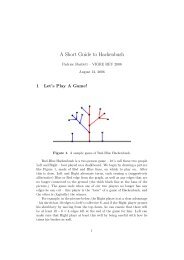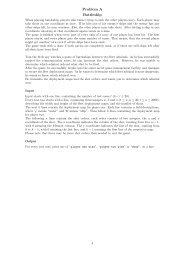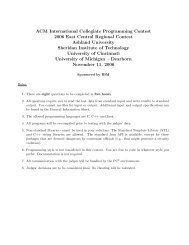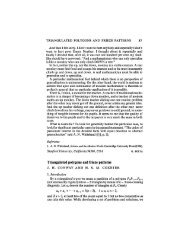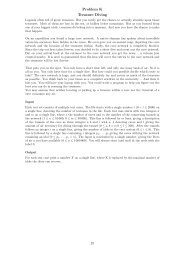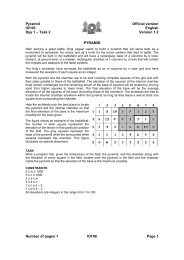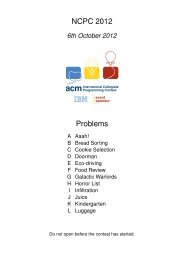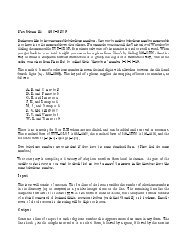Review1 of Liber De Ludo Aleae (Book on Games of Chance) by ...
Review1 of Liber De Ludo Aleae (Book on Games of Chance) by ...
Review1 of Liber De Ludo Aleae (Book on Games of Chance) by ...
Create successful ePaper yourself
Turn your PDF publications into a flip-book with our unique Google optimized e-Paper software.
Review 1 <str<strong>on</strong>g>of</str<strong>on</strong>g> Corresp<strong>on</strong>dence between Pierre de Fermat and Blaise Pascal<br />
1. Biographical Notes<br />
Pierre de Fermat was born in 1601 at Beaum<strong>on</strong>t-de-Lomagne, studied law at the University <str<strong>on</strong>g>of</str<strong>on</strong>g> Toulouse,<br />
and served there as a judge. He appears to have corresp<strong>on</strong>ded a great deal with scientists in Paris, as well<br />
as with others, including Pascal, about mathematical ideas. His interests included the theory <str<strong>on</strong>g>of</str<strong>on</strong>g> numbers,<br />
and is well known for the propositi<strong>on</strong> that the equat<strong>on</strong> x n + y n = z n has no soluti<strong>on</strong>s in the positive integers<br />
(>2). He died at Castres in 1665.<br />
Blaise Pascal was born at Clerm<strong>on</strong>t in 1623, and died in Paris in 1662. In additi<strong>on</strong> to his c<strong>on</strong>tributi<strong>on</strong>,<br />
al<strong>on</strong>g with Fermat, to the science <str<strong>on</strong>g>of</str<strong>on</strong>g> probability, he is well known for his work in geometry and<br />
hydrostatics. Pascal wrote the Essai pour les C<strong>on</strong>iques, and invented (and sold) a mechanical calculating<br />
machine. He may be most famous for his philosophical and religious writings, and is the author <str<strong>on</strong>g>of</str<strong>on</strong>g> the<br />
Pensees.<br />
2. Review <str<strong>on</strong>g>of</str<strong>on</strong>g> the corresp<strong>on</strong>dence<br />
This summary is primarily c<strong>on</strong>cerned with ideas presented in the first two letters <str<strong>on</strong>g>of</str<strong>on</strong>g> a collecti<strong>on</strong> <str<strong>on</strong>g>of</str<strong>on</strong>g><br />
corresp<strong>on</strong>dence written over a period from 1654 to 1660. The first letter in this series is from Fermat to<br />
Pascal, and is undated, although it was likely written in June or July <str<strong>on</strong>g>of</str<strong>on</strong>g> 1654 (based <strong>on</strong> the dates <str<strong>on</strong>g>of</str<strong>on</strong>g><br />
subsequent corresp<strong>on</strong>dence from Pascal). It would seem that Pascal had earlier written to Fermat,<br />
discussing the problem relating to the divisi<strong>on</strong> <str<strong>on</strong>g>of</str<strong>on</strong>g> stakes in a wager <strong>on</strong> a game <str<strong>on</strong>g>of</str<strong>on</strong>g> dice, when the game is<br />
suspended before completi<strong>on</strong>. The questi<strong>on</strong> appears to have been: If a player needs to get 1 point (a<br />
specific side <str<strong>on</strong>g>of</str<strong>on</strong>g> the die) in eight throws <str<strong>on</strong>g>of</str<strong>on</strong>g> the die, and after the first three throws has not obtained the<br />
required point, how much <str<strong>on</strong>g>of</str<strong>on</strong>g> the wager should be distributed to each player if they agree to disc<strong>on</strong>tinue<br />
play?<br />
Fermat’s letter suggests that Pascal reas<strong>on</strong>ed 125/1,296 <str<strong>on</strong>g>of</str<strong>on</strong>g> the wager should be given to the player. Fermat<br />
disagrees with this, proposing that the player should receive 1/6 <str<strong>on</strong>g>of</str<strong>on</strong>g> the wager. Fermat’s argument is surely<br />
based <strong>on</strong> the equal possibility <str<strong>on</strong>g>of</str<strong>on</strong>g> outcomes for points 1 to 6, due to the symmetry <str<strong>on</strong>g>of</str<strong>on</strong>g> the die.<br />
Fermat distinguishes between an assessed value for a throw not taken, with subsequent c<strong>on</strong>tinuati<strong>on</strong> <str<strong>on</strong>g>of</str<strong>on</strong>g><br />
the game, and the agreed completi<strong>on</strong> <str<strong>on</strong>g>of</str<strong>on</strong>g> play before eight throws. His reas<strong>on</strong>ing is as follows:<br />
“If I try to make a certain score with a single die in eight throws…[and] we agree that I will not make the<br />
first throw; then, according to my theory, I must take in compensati<strong>on</strong> 1/6 th <str<strong>on</strong>g>of</str<strong>on</strong>g> the total sum…Whilst if we<br />
agree further that I will not make the sec<strong>on</strong>d throw, I must, for compensati<strong>on</strong>, get a sixth <str<strong>on</strong>g>of</str<strong>on</strong>g> the remainder<br />
which comes to 5/36 th <str<strong>on</strong>g>of</str<strong>on</strong>g> the total sum…If, after this, we agree that I will not make the third throw, I must<br />
have…a sixth <str<strong>on</strong>g>of</str<strong>on</strong>g> the remaining sum which is 25/216 th <str<strong>on</strong>g>of</str<strong>on</strong>g> the total…And if after that we agree that I will<br />
not make the fourth throw…I must again have a sixth <str<strong>on</strong>g>of</str<strong>on</strong>g> what is left, which is 125/1,296 th <str<strong>on</strong>g>of</str<strong>on</strong>g> the total, and<br />
I agree with you that this is the value <str<strong>on</strong>g>of</str<strong>on</strong>g> the fourth throw, assuming that <strong>on</strong>e has already settled for the<br />
previous throws.”<br />
The argument can be summarised in the following table:<br />
1 Submitted for STA 4000H under the directi<strong>on</strong> <str<strong>on</strong>g>of</str<strong>on</strong>g> Pr<str<strong>on</strong>g>of</str<strong>on</strong>g>essor Jeffrey Rosenthal.<br />
8




